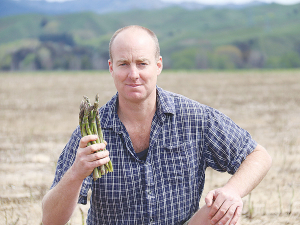First ever biofuel kiwifruit charter completed
Fresh Carriers Co. Ltd (FCC) and Zespri have completed the first ever kiwifruit charter powered by a low-emissions fuel.
 Asparagus council chair Sam Rainey says the spiraling cost of air freight means it is unlikely that any NZ-grown asparagus will be exported this season.
Asparagus council chair Sam Rainey says the spiraling cost of air freight means it is unlikely that any NZ-grown asparagus will be exported this season.
It's unlikely any NZ-grown asparagus will be exported this season.
That's the word from the chair of the asparagus council, Sam Rainey, who says the spiraling cost of air freight has made this impossible.
Traditionally, NZ asparagus is exported to Japan, Singapore and some of the Pacific nations. However, Rainey told Rural News that huge freight rate rises - due to the Covid pandemic - mean it is no longer profitable to send the highly desirable vegetable overseas.
"The reality is that exporting was barely profitable before Covid and the fact that it is not now makes it really challenging for the industry, which has to rely entirely on the domestic market."
Rainey says the issue with asparagus is that its production season is short - October through to December - and it's not easy to spread the growth of the crop. In warm weather, asparagus grows quickly and needs to be harvested immediately, and there is a risk of a glut of it on the market. This is despite the fact that the industry has shrunk significantly over the years.
"As growers we all understand the market and the nature of the crop, so no one wants that oversupply," he explains.
"The supermarkets and growers want a nice, consistent fresh supply. Remember asparagus is highly perishable and you want to be eating it fresh. As an industry, we need to manage that."
With the industry now confined to the domestic market, the challenge is to get more people to eat asparagus, Rainey says the industry has invested heavily in promotional activities in an effort to increas asparagus consumption and he is confident that they can do this.
"But what blows me away is that so many young people don't eat asparagus and we need to manage that as an industry," he adds.
"It's about getting people to open their eyes to asparagus because it's nutritious, versatile and really good for you and you can add it to any dish."
New Zealand and Chile have signed a new arrangement designed to boost agricultural cooperation and drive sector success.
New DairyNZ research will help farmers mitigate the impacts of heat stress on herds in high-risk regions of the country.
Budou are being picked now in Bridge Pā, the most intense and exciting time of the year for the Greencollar team – and the harvest of the finest eating grapes is weeks earlier than expected.
The Real Estate Institute of New Zealand (REINZ) has released its latest rural property report, providing a detailed view of New Zealand’s rural real estate market for the 12 months ending December 2025.
Rural retailer Farmlands has released it's latest round of half-year results, labeling it as evidence that its five-year strategy is delivering on financial performance and better value for members.
OPINION: "We are back to where we were a year ago," according to a leading banking analyst in the UK, referring to US president Donald Trump's latest imposition of a global 10% tariff on all exports into the US.

OPINION: A mate of yours truly reckons rural Manawatu families are the latest to suffer under what he calls the…
OPINION: If old Winston Peters thinks building trade relations with new nations, such as India, isn't a necessary investment in…